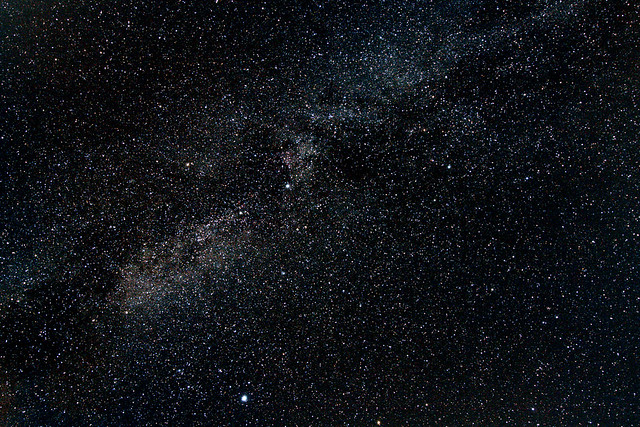.

Polar mesospheric cloud (bright noctilucent cloud over Lake Saimaa, Finland): photo by Mika Yrjölä, August 2003
Night
had fallen, but without his knowing whether it was only within him or
in the room: to him everything now was night. And night was also in
motion: darkness gave way to more darkness. But
this darkness, different from what the eyes see, quivered with colors
issuing, as it were, from the very absence of color: black turned to
livid green, and then to pure white; that pure, pale white was
transmuted into a red gold, although the original blackness remained,
just as the fires of the stars and the northern lights pulsate in what
is, notwithstanding, total night. For an instant which seemed to him
eternal, a globe of scarlet palpitated within him, or perhaps outside
him, bleeding on the sea. Like the summer sun in polar regions, that
burning sphere seemed to hesitate, ready to descend one degree toward
the nadir; but then, with an almost imperceptible bound upward, it began
to ascend toward the zenith, to be finally absorbed in a blinding
daylight which was, at the same time, night.
Marguerite Yourcenar (1903-1987), from The Abyss (first published in French as L'oeuvre au noir, 1968), translated by Grace Frick, 1976

A slice of Milky Way: photo by Mika Yrjölä, 15 September 2009



8 comments:
Tom,
Polar mesospheric cloud (bright noctilucent cloud)
"from the very absence of color: black turned to livid green, and then to pure white; that pure, pale white was transmuted into a red gold, although the original blackness remained"
10.30
light coming into sky above still black
ridge, plane of fog moving to the right
in foreground, wave sounding in channel
above all in thinking ahead
brings it, such a way
another picture painted and,
without a frame, here
grey white fog against invisible ridge,
whiteness of gull disappearing into it
Many thanks Steve.
This morning's plane or bloc of fog, over here, was the densest I've seen in many a year, contained a light rain at 6 a.m., and, suffused by the lucent haze over the freeway feeder, made the relentless commute headlights appear as faint beams carved through a red blizzard.
For those who may be unfamiliar with the author here today...
The remarkable Marguerite Yourcenar, a brave revenant of the classic attitude, left us with many sentences to ponder in awe.
No modern writer has done more to revive and reshape the philosophical spirit of the historical novel.
The Abyss is a narrative of the struggles of a freethinking intellectual wanderer in a sixteenth century Europe torn by war, plague and religious and social upheaval.
This novel was her second masterpiece. She recounts the experience of composing the first, Memoirs of Hadrian (1951, translated 1955) -- aboard a Santa Fe Zephyr (of all places) -- at the bottom of this post:
Animula Blandula, Vagula
Beautiful. I see she was travelling speedily.
This is a very fine introduction to an author I'd not read at all. This will be remedied soon. Thanks for this. I do love a fluid hand with prose.
How astoundingly beautiful, that first photo especially. The sky, our constant companion. I’m looking around for a copy of The Abyss . . . while riding out the worst of a three-day blow.
So light at night. Words
being what they are.
Bright fires that change.
This cannot explain it.
The poet warned of this.
But still to fall
in love with the light--
there isn't enough.
Then, I'd rather watch
you watching.
Wow, this is amazing.
In Finland, I lost my mind. Strange, thin trees. Nothing central to the landscape. Except the lake. Its shore, its clicks. Where we took the rugs down that summer in a little cart, a brush, a cake of goat fat soap. I saw pictures from the war. Saw her dressed in white, surrounded by the soldiers. They wouldn’t let me take it with me. Thought it strange how I was fascinated by her glow. We danced with the others in the small pavilion to old timey music that had an accordion. My Finnish father was “Father” and my Finnish mother was “Mother.” I racked my brain all summer long to try to figure out inventive things to say to them. They prized the language of physical labor above all else. Their own daughter was a little spoiled and sick of the farm. I lost myself in it and began to see the magic of the clean, ordinary lines up there where it sounded like pick-up sticks when people spoke.
Post a Comment